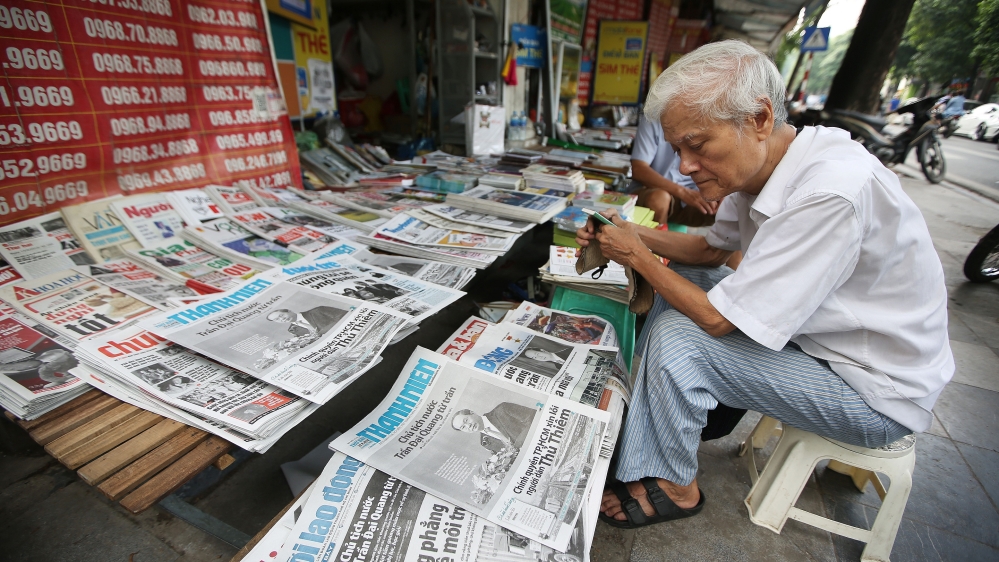Several human rights groups voiced their dismay over the arrest of Luat Khoa and The Vietnamese co-founder, Pham Doan Trang just hours after annual U.S.-Vietnam human rights talks. Human Rights Watch calls the arrest a “scorched earth response” to political dissent in the country.
- Title: Rights Groups Deplore Arrest of Vietnam Writer and Activist Pham Doan Trang
- Publish Date: October 8, 2020
- Publisher: Voice of America (VOA)
Excerpt:
Outspoken Vietnamese democracy activist and author Pham Doan Trang has been arrested on anti-state propaganda charges, police and state media said Wednesday, as rights groups condemned her apprehension just hours after annual U.S.-Vietnam human rights talks and warned that the blogger faced the risk of torture in custody.
Pham Doan Trang was arrested at an apartment in Ho Chi Minh City on Tuesday night and charged under article 117 of the Vietnamese Penal Code, accused of “making, storing, distributing or disseminating information, documents and items against the Socialist Republic of Vietnam,” To An Xo, a spokesperson of the Ministry of Public Security, said. Trang, described by state media as a blogger who used to work for various publications in Vietnam, was transferred to Hanoi.
If convicted, she could face up to 20 years in prison, Amnesty International said, warning that she faced serious danger in official custody.
“Pham Dan Trang faces an imminent risk of torture and other-ill treatment at the hands of the Vietnamese authorities. She must be immediately and unconditionally released,” said Amnesty International’s Deputy Regional Director for Campaigns, Ming Yu Hah, in a statement.
“The arrest of Pham Doan Trang is reprehensible. She is a leading figure in the struggle for human rights in Viet Nam. She has inspired countless young activists to speak up for a more just, inclusive, and free Vietnam,” said Hah.
‘Scorched earth response’
Human Rights Watch noted that her arrest occurred “just a few hours after the annual human rights dialogue between the United States and Vietnam” and that she was immediately charged.
“Vietnam’s scorched earth response to political dissent is on display for all to see with the arrest of prominent blogger and author Pham Doan Trang,” said Phil Robertson, deputy Asia director of Human Rights Watch.
“Every day she spends behind bars is a grave injustice that violates Vietnam’s international human rights commitments and brings dishonor to the government,” he said in a statement.
“Governments around the world and the UN must prioritize her case, speak out loudly and consistently on her behalf, and demand her immediate and unconditional release,” added Robertson.
Rachael Chen, spokesperson for the U.S. Embassy in Hanoi, said the mission was concerned about the reported arrest and “monitoring the situation closely.”
“We urge the Vietnamese government to ensure its actions and laws are consistent with Vietnam’s international obligations and commitments,” she said in an e-mailed comment.
“Authors, bloggers, and journalists often do their work at great risk, and it is the duty of governments and citizens worldwide to speak out for their protection,” said Chen.
Spate of arrests
Following Trang’s arrest, her friends posted a message they said was written by her in advance, that read: “Nobody wants to go to jail, but if prison is the place for those who fight for freedom, and if it is the place to carry out set goals, then we should go to prison.”
Human Rights Watch noted that last month Trang had published the third edition of a report of a violent clash at Dong Tam commune outside Hanoi in January. The publication of the first edition of that report one week after the incident led to the arrest in June three out of five authors of the report, Can Thi Theu and her sons Trinh Ba Phuong and Trinh Ba Tu. They were also charged with for anti-state propaganda.
Amid a spate of arrests and abuse of independent journalists this year in Vietnam, Trang told RFA in May that toleration of dissent was deteriorating and likely to get worse in the run-up to the ruling Communist Party congress in January.
“Freedom has always been restricted, but nowadays it seems to be narrower, and there’s more and more violence,” she said at the time. “From now until the party congress, the scope of freedom can be tightened more and more, and the suppression will increase.”
Trang, who released a well-regarded book titled Politics for Everyone, was awarded the Reporters Without Borders 2019 Press Freedom Prize. She founded the online legal magazine Luat Khoa and edits another web-based rights journal called thevietnamese.
Download:

